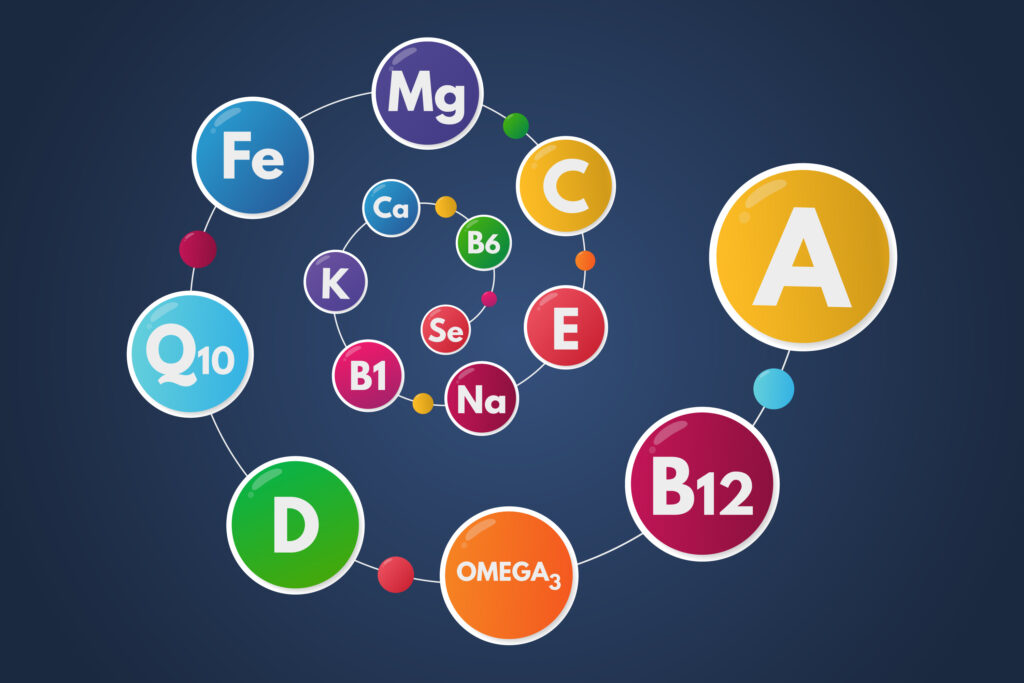
Have you ever heard the saying “good things come in small packages”? Well, that definitely applies to micronutrients! These tiny but crucial players in our health are like the secret ingredients that keep our bodies running smoothly. But what happens when we don’t get enough of them? That’s where micronutrient deficiencies come in, and they can cause a surprising number of problems.
In this article, we’ll be diving deep into the micronutrient deficiencies and their impact on your health. We’ll explore what they are, why they’re important, and what happens when our bodies don’t get enough. We’ll also talk about how to spot the signs of a deficiency and what you can do to ensure you’re getting the micronutrients you need to stay healthy and energized.
Micronutrients: The Tiny Titans of Health
Unlike macronutrients, like carbohydrates, protein, and fat, which our bodies need in large amounts for energy, micronutrients are needed in much smaller quantities. But don’t let their size fool you! They play a vital role in almost every bodily function, from building strong bones and teeth to keeping your immune system fighting fit.


Here are some of the key types of micronutrients and their functions:
- Vitamins: These essential building blocks are involved in a wide range of processes, including energy production, cell growth, and maintaining healthy vision. Some important vitamins include Vitamin A (important for vision and immunity), Vitamin C (boosts the immune system and helps with iron absorption), and the B vitamins (essential for energy production and brain function).
- Minerals: These elements are crucial for building strong bones and teeth, regulating fluids in the body, and helping muscles and nerves function properly. Important minerals include calcium (builds strong bones and teeth), iron (carries oxygen in the blood), and iodine (needed for healthy thyroid function).
Also Read: Explore 10 Keto-Friendly Meal Prep Ideas for a Healthy Lifestyle
Why are Micronutrient Deficiencies a Concern?
Micronutrient deficiencies happen when our bodies don’t get enough of a particular vitamin or mineral. This can happen for a few reasons:
- Diet: If you don’t eat a variety of healthy foods, especially fruits, vegetables, and whole grains, you’re more likely to be deficient in some micronutrients.
- Medical conditions: Certain medical conditions can affect how your body absorbs nutrients.
- Medications: Some medications can interfere with nutrient absorption.
Also Read: Is Vitamin Water Good For Pregnant Women? | Navigating the World of Hydration
Micronutrient Deficiencies and Their Impact
While a deficiency in one micronutrient might seem minor, it can actually have a big impact on your health. Here are some of the common signs and symptoms of micronutrient deficiencies:
- Fatigue and low energy: This is a common symptom of many deficiencies, including iron deficiency anemia and B vitamin deficiencies.
- Weak immune system: Deficiencies in Vitamin A, C, and zinc can make you more susceptible to infections.
- Skin problems: Dry, itchy skin, hair loss, and brittle nails can be signs of deficiencies in vitamins A, B, and biotin.
- Muscle cramps and aches: Electrolyte imbalances caused by mineral deficiencies, like magnesium or potassium, can lead to muscle cramps.


- Vision problems: Vitamin A deficiency can lead to night blindness and other vision problems.
If you’re experiencing any of these symptoms, it’s important to talk to your doctor. They can do a simple blood test to check your micronutrient levels and recommend the best course of action.
Getting the Mighty Micros You Need
The good news is that there are plenty of things you can do to ensure you’re getting enough micronutrients! Here are some tips:
- Eat a rainbow! Fill your plate with a variety of colorful fruits and vegetables. Each color offers a unique range of vitamins and minerals.


- Go whole grain: Opt for whole grains over refined grains whenever possible. Whole grains are packed with nutrients, while refined grains often have the bran and germ removed, where most of the nutrients are found.
- Include lean protein sources: Lean meats, poultry, fish, beans, and lentils are good sources of iron and other important vitamins and minerals.
- Don’t forget healthy fats! Healthy fats, like those found in avocados, nuts, and fatty fish, are essential for absorbing certain vitamins, like Vitamin A.
- Consider a multivitamin: While a healthy diet should be your primary source of micronutrients, a multivitamin can help fill any gaps in your diet.
Remember: Before starting any supplements, talk to your doctor. They can help you determine if a multivitamin is right for you and recommend the right dosage.
Beyond Food: Taking Charge of Your Micronutrient Health
Here are some additional things you can do to boost your micronutrient health:
- Talk to a Registered Dietitian: A registered dietitian (RD) can help you create a personalized eating plan that ensures you’re getting all the micronutrients you need.
- Get Enough Sunlight: Sunlight helps your body produce Vitamin D, which is crucial for bone health and immune function. Aim for 10-15 minutes of unprotected sunlight exposure most days of the week (avoid peak sun hours).
- Manage Stress: Chronic stress can deplete your body’s nutrient stores. Practice stress-reduction techniques like yoga, meditation, or deep breathing.
- Maintain a Healthy Gut: A healthy gut microbiome is essential for nutrient absorption. Eat plenty of probiotic-rich foods like yogurt and kimchi, and consider taking a probiotic supplement if recommended by your doctor.
- Stay Hydrated: Water is essential for overall health and nutrient absorption. Aim to drink plenty of water throughout the day.
Remember, a healthy balance is key! While it’s important to get enough micronutrients, too much of a good thing can be bad. Always follow recommended dosages for supplements and avoid taking megadoses of any single vitamin or mineral.
The Takeaway: Embrace the Mighty Micros!
Micronutrients are tiny but powerful players in our health. By understanding the importance of these essential elements and taking steps to ensure you’re getting enough, you can support your overall well-being and keep your body running at its best. Here are some key takeaways:
- Micronutrients are essential vitamins and minerals needed in small amounts for various bodily functions.
- Micronutrient deficiencies can cause fatigue, weak immune system, skin problems, and more.
- Eat a balanced diet rich in fruits, vegetables, whole grains, lean protein, and healthy fats.
- Consider a multivitamin after consulting your doctor.
- Explore other ways to boost your micronutrient health, like managing stress and gut health.
By taking charge of your micronutrient health, you’re investing in a healthier, happier you!
Understanding Micronutrient Deficiencies and Their Impact on Your Health: FAQs
- I eat a healthy diet, so why would I be deficient in micronutrients?
Even a seemingly healthy diet might not provide all the micronutrients you need. Factors like soil depletion (leading to less nutrients in fruits and vegetables), picky eating, or certain dietary restrictions can contribute to deficiencies. Additionally, some people have higher nutrient needs due to factors like pregnancy, breastfeeding, or certain medical conditions.
- What are some of the most common micronutrient deficiencies?
Iron deficiency anemia, especially among women and children, is a major concern globally. Other common deficiencies include Vitamin D deficiency, affecting bone health and immunity, and Vitamin B12 deficiency, which can lead to fatigue and nerve problems.
- How can I tell if I have a micronutrient deficiency?
Many symptoms of micronutrient deficiencies are general, like fatigue, weakness, or headaches. However, some deficiencies have specific signs. For example, dry, itchy skin can be a sign of a B vitamin deficiency, while bleeding gums might indicate Vitamin C deficiency. If you’re concerned about a deficiency, talk to your doctor. They can do a simple blood test to check your levels.
- Are there any risks associated with taking multivitamins?
While multivitamins can be a helpful way to fill gaps in your diet, it’s important to remember that they shouldn’t replace a healthy diet. Taking megadoses of certain vitamins and minerals can actually be harmful. Always consult your doctor before starting any supplements, and follow the recommended dosage.
- Can I get all the micronutrients I need from supplements alone?
Supplements can be a valuable tool, but they shouldn’t be your sole source of micronutrients. Whole foods are packed with a variety of nutrients that work synergistically to support your health. Aim to get most of your micronutrients from a balanced diet, and use supplements to fill any gaps.
- Are there any specific foods I should eat to avoid micronutrient deficiencies?
There’s no single “magic food” for micronutrients. The key is variety! Aim for a rainbow on your plate by eating a wide range of colorful fruits and vegetables. Include whole grains, lean protein sources, and healthy fats in your diet for a well-rounded approach to micronutrient intake.
- I have a chronic health condition. Am I more at risk for micronutrient deficiencies?
Certain medical conditions can affect how your body absorbs nutrients. If you have a chronic illness, it’s important to talk to your doctor about your micronutrient needs. They may recommend specific dietary changes or supplements based on your condition.
- How can I support a healthy gut microbiome for better micronutrient absorption?
The gut microbiome plays a crucial role in nutrient absorption. Include probiotic-rich foods like yogurt, kimchi, and fermented vegetables in your diet. You can also consider taking a probiotic supplement after consulting your doctor.
- Is there a connection between stress and micronutrient deficiencies?
Chronic stress can deplete your body’s nutrient stores. Practice stress-reduction techniques like yoga, meditation, or deep breathing to manage stress and support your overall health, including micronutrient levels.
- What if I suspect I have a micronutrient deficiency? What should I do?
If you’re concerned about a micronutrient deficiency, talk to your doctor. They can do a blood test to check your levels and discuss your dietary habits. Based on the results, they can recommend the best course of action, which might include dietary changes, a multivitamin, or addressing any underlying medical conditions.

